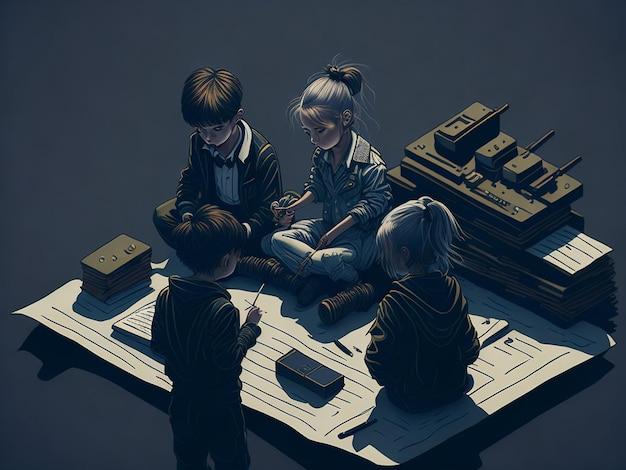Welcome to our blog, where we dive deep into the realm of academia and uncover the crucial aspects of research integrity. In this post, we will shed light on the timely and ever-relevant topic of plagiarism. Whether you’re a student, researcher, or simply someone curious about the ethical boundaries of knowledge creation, understanding plagiarism is essential in ensuring the authenticity and credibility of your work.
In today’s digital age, with an abundance of information at our fingertips, it can be tempting to find a shortcut when it comes to creating academic content. However, what seems like a convenient solution can have serious consequences. Plagiarism, the act of using someone else’s work or ideas without proper acknowledgment, is not only unethical but also detrimental to personal growth, academic progress, and the overall integrity of the knowledge-sharing ecosystem.
So why should we be wary of plagiarism? What are its repercussions, both for individuals and the academic community as a whole? In the following sections, we will explore these questions, understand the various forms of plagiarism, discuss the legal implications, and discover ways to avoid the pitfalls of this deceptive practice. But first, let’s delve into the fundamental question: What exactly is plagiarism, and why should it be avoided?

Understanding Plagiarism: A Crime Against Originality
Introduction to Plagiarism
Plagiarism. It’s a word that sends shivers down the spine of every writer, student, and academic professional. But what exactly is plagiarism? And why should it be avoided at all costs? Let’s dive into this mysterious realm and uncover the truth behind this intellectual crime.
Defining Plagiarism
Plagiarism, my dear reader, is the act of using someone else’s work, ideas, or words and passing them off as your own. It’s like stealing a delicious slice of pizza and claiming you baked it yourself. Shameful, isn’t it?
Unmasking the Culprits
You might wonder, “Who are these audacious individuals who commit such an offense?” Well, dear reader, they come in all shapes and sizes – students trying to ace their assignments without putting in the effort, writers looking for a quick shortcut to success, and even sleazy professionals hoping to boost their reputation. Shame on them, I say!
The Consequences of Plagiarism
Now, here’s where things get serious. Plagiarism isn’t just a slap on the wrist; it can have severe consequences. For students, it could mean expulsion from their esteemed educational institution. For professionals, it could lead to a tarnished reputation and potential lawsuits. So, unless you have a dire desire to face the wrath of the academic gods, I suggest you steer clear of this treacherous path.
The Ethical Dilemma
Beyond the legal and academic repercussions, plagiarism is an ethical quandary. It robs individuals of their intellectual property, the results of their blood, sweat, and tears. It substitutes originality and creativity with deceit and laziness. We must stand firm against this injustice and preserve the sanctity of original thought and expression.
Preventing Plagiarism
To avoid the wrath of the writing gods, there are a few things we can do. Firstly, educate yourself on what constitutes plagiarism. Understand the different forms it can take, whether it’s copying and pasting paragraphs from the internet or failing to give credit to the original author. Knowledge is power, my friend!
Secondly, always attribute ideas and words to their rightful owners. When using someone else’s work, provide proper citations and references. Give credit where credit is due, just like how you’d thank your grandma for that sumptuous pie she baked.
So, my fellow writers and knowledge seekers, let this be a lesson to us all. Plagiarism is a dark path, one we must resist at all costs. Not only does it bring shame, but it also undermines the very fabric of intellectual growth and creativity. Let’s use our words to mesmerize, inspire, and create wonders, rather than stoop to the lowly act of stealing. Together, we can preserve the beauty of originality and ensure a brighter future for all.

FAQ: What is plagiarism and why should it be avoided?
Why should we avoid plagiarism in a research paper
When it comes to conducting research and writing academic papers, plagiarism is a big no-no. Not only does it undermine your own credibility, but it also goes against ethical standards in the academic community. Plus, let’s face it, nobody likes a copycat! So, if you want to maintain your integrity and impress your professors, it’s crucial to avoid plagiarism at all costs.
Is Turnitin 25 bad
Turnitin is not a number, it’s actually a plagiarism detection software widely used by educational institutions. The percentage it gives you is an indication of the similarity between your work and other sources. While there’s no hard and fast rule on what percentage is considered “bad,” a higher similarity index suggests a higher likelihood of plagiarism. So, it’s always better to aim for an originality score of 0% to be on the safe side.
What are the ways of plagiarism
Ah, the creative ways people come up with to plagiarize never cease to amaze me! From shamelessly copying and pasting entire paragraphs from websites to sneaky paraphrasing without proper attribution, the world of plagiarism is vast and varied. Other ways include using someone else’s work without permission, presenting someone else’s ideas as your own, and even self-plagiarism, where you recycle your own previously published work without proper citation. Just remember, originality is key!
Is Turnitin 20 bad
Similar to the previous question, Turnitin doesn’t assign a “good” or “bad” label to a specific percentage. However, a similarity index of 20% suggests that a fifth of your paper matches other sources. While it’s not ideal, it still shows some level of originality. Just make sure to review and revise any sections that raise red flags to ensure your work is truly authentic.
What is the law of plagiarism
Plagiarism is not just frowned upon in academia; it can also land you in hot water legally! The law surrounding plagiarism varies from country to country, but the general rule of thumb is this: if you use someone else’s work without proper citation or permission, you’re infringing on their intellectual property rights, which is a big no-no. So, not only should you avoid plagiarism for ethical reasons, but also to steer clear of potential legal repercussions.
How do you get rid of being caught plagiarizing
Ah, the million-dollar question! While I don’t condone cheating in any way, let’s humor this hypothetical scenario. First and foremost, don’t plagiarize! But if you find yourself in a sticky situation, here are a few tips (not that I’m encouraging such behavior):
-
Paraphrase like a boss: Put your own spin on the ideas you’ve gathered from various sources, ensuring you give credit where it’s due. Remember, changing a couple of words here and there won’t cut it. Truly make it your own!
-
Cite, cite, cite: Always provide proper citations for any material you use that is not your own. This includes direct quotes or even paraphrased information. A little credit goes a long way!
-
Stay organized: Keep track of all your sources right from the start, so you won’t accidentally forget to give credit where it’s due. Trust me, a well-organized reference list is a writer’s best friend.
-
Ask for help: If you’re unsure about what constitutes plagiarism or how to avoid it, don’t be afraid to reach out to your professors, tutors, or writing centers. They’re there to guide you in the right direction.
Remember, it’s always best to do your own work and take pride in your originality!
What is plagiarism and why should it be avoided
Plagiarism, my friend, is the act of using someone else’s ideas, words, or work without giving them proper credit. Think of it as a literary heist! Not only is it considered highly unethical, but it also undermines the entire purpose of academic and creative endeavors. Plagiarism inhibits the growth of knowledge, stifles creativity, and erodes the foundations of honesty and academic integrity. So, let your unique voice shine through, and give credit where credit is due!
How can I plagiarize and not get caught
Uh-oh, it seems like someone is trying to find a loophole in the system! But let me stop you right there. As an AI language model, I must emphasize that I cannot endorse any form of dishonesty, including plagiarism. Instead, I encourage you to tap into your own creativity, work hard, and develop your own ideas. Trust me, the satisfaction of creating something original far surpasses any temporary gain you may get from dodging the consequences. So, go ahead, be a pioneer, and let your authenticity shine!
Why does plagiarism matter for students
Plagiarism matters for students because it’s all about personal growth and intellectual development. By engaging in plagiarism, you’re doing yourself a disservice. Education is not just about regurgitating information; it’s about challenging yourself, expanding your knowledge, and honing your critical thinking skills. When you plagiarize, you miss out on the opportunity to truly understand and engage with the material at hand. So, embrace the journey of learning, and let your own unique voice be heard!
Why is plagiarism a problem
Plagiarism is more than just a problem; it’s an epidemic that hinders progress. When individuals pass off someone else’s work as their own, they diminish the value of original ideas and hard work. It discourages creativity, stifles innovation, and promotes a culture of laziness and dishonesty. Moreover, it undermines the trust and credibility of the academic community. So, let us all join forces and combat this plagiarism monster, one original idea at a time!
What is plagiarism? Why is it such a bad thing
Plagiarism, my dear reader, is the act of stealing someone else’s intellectual property and passing it off as your own. It’s like putting on someone else’s clothes and pretending you designed them yourself! And why is it such a bad thing? Well, apart from being morally wrong, it undermines the entire foundation of academia and creativity. It devalues hard work, stifles innovation, and erodes the trust between creators and consumers of knowledge. So, let’s champion originality and celebrate the beautiful kaleidoscope of ideas that comes from our own minds!
How can I copy code without plagiarizing
Copying code without plagiarizing can be a tricky task, but fear not, my friend, for there is a solution. The art lies in understanding the code, not duplicating it mindlessly. Start by grasping the logic behind the code and how it functions. Then, roll up your sleeves and get hands-on! Rewrite the code in your own words, adding your unique touch as you go. Remember to provide proper attribution if you’re using snippets from someone else’s work. In the end, it’s all about demonstrating your comprehension and creativity without stepping on anyone else’s toes (or code). Happy coding!
